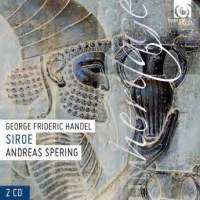Texte paru dans: / Appeared in: |
|
|
Outil de traduction (Très approximatif) |
|
|
Reviewer: Brian Robins |
|
|
Siroe appeared at a difficult
time for Handel. The Royal Academy of Music, the consortium of noblemen that
had been promoting his operas (and those of Giovanni Bononcini and Ariosti)
since 1720, was close to bankruptcy, thanks largely to the exorbitantly
extravagant fees paid to its star singers. Handel attempted unsuccessfully
to head off looming disaster with three new operas, Riccardo primo, Sime,
and Tolomeo, although Sime, which opened at the King's Theatre on February
17, did achieve the distinction of an opening run of 18 performances, with
Alcina the highest figure achieved by any Handel opera. But Sime was never
revived by Handel, and has gone down as one of the less successful of his
operas. For this the blame has generally been laid at the door of Handel's
librettist Nicola Haym, who contrived to make something of a dog's dinner of
a well-argued libretto (first set in 1726 by Vinci) by the young Metastasio.
Haym's long experience of London opera audiences suggested they would not
sit through Metastasio's extensive recitatives, which he cut at the expense
of dramatic verisimilitude. It is worth noting that the recitative has been
further cut for the present recording, which is described as “abridged.“
The story of political
ambition and intrigue is set at the court of King Cosroe of Persia in the
first century A.D. His younger son Medarse is set on maneuvering succession
to the throne at the expense of his elder brother Siroe, who has additional
problems in the shape of the two women in his life, Laodice, the king's
mistress who loves him, and Emira, the woman loved by Siroe, who spends most
of the opera disguised as a man in order to seek revenge on Cosroe for the
death of her father. Ultimately, of course, all is resolved, with Siroe and
Emira united and the former crowned as the new Persian king.
Handelians tend to claim that
the story and its characters failed to arouse sufficiently Handel's
interest, yet Handel was motivated by less promising plots than that of
Siroe. More to the point is surely the fact that Handel was not the ideal
composer to set Metastasio's exquisite lyrics, which are frequently
allegorical or stylized, rarely entering the highly personal world that
inspired his finest character creations. While many of the opera's arias are
splendid in themselves, only the act III scene in which Siroe awaits death
in prison emerges with any real dramatic strength. Here Handel gave Senesino
“Deggio morire,“ a superb tragic aria in which the hero laments his
hopelessly forlorn situation. It is beautifully done here by Ann Hallenberg,
who produces some ravishingly lovely mezza voce singing.
Hallenberg is one of the
performance's great successes, confirming the outstanding qualities she
revealed in Spering's recent imeneo for cpo (Fanfare 21:6), singing
throughout with richly burnished tone and technical assurance. In other
ways, however, the set strikes me as less consistently excellent than Imeneo.
For this most of the blame must be laid at the door of the conductor
himself, whose pacing lacks the unerring judgment he brought to Imeneo.
Several arias, most damagingly Laodice's act-II “Mi lagnerò tacendo,“ are
taken too slowly and also suffer from sluggish rhythms. The ornamentation of
da capo repeats is frequently allowed to go far beyond reasonable bounds.
Neither, I'm afraid, can criticism of over-fussy harpsichord continüo-playing
be avoided. Notwithstanding, it must also be stressed that much of Spering's
direction confirms the positive Handelian credentials he established in
Imeneo, with particular praise due for the fine playing he draws from
Cappella Coloniensis.
In general tenns, Spering's
cast is excellent. I've already mentioned Hallenberg's splendid Siroe, and
Johanna Stojkovic's Emira deserves to be considered in much the same terms.
It is a strongly delivered and finely executed interpretation of a role I
suspect suffers particularly from the alterations to the original libretto.
Her fellow prima donna, Sunhae Im, is less happily cast as Laodice. Not only
does her light voice sound too young for Cosroe's lady friend, but it also
takes on an unpleasing metallic hardness in the upper register. But
“Torrente crescuito“ is delicious, Handel's featherweight depiction of the
swirling eddies of the text's “swollen stream“ realized to perfection by
both singer and orchestra. The secondary roles are all well-filled,
especially in the case of Sebastian Noack's agilely sung, and authoritative
Cosroe, while on the evidence of his Medarse, Gunther Schmid sounds like
another highly promising addition to the ever-burgeoning roster of fine
countertenors. As with a number of the less familiar Handel operas, the sole competition comes, to the best of my knowledge, from a Newport Classics recording under Rudolf Palmer. My guess from the Palmer Handel recordings I do know is that, for all his faults, Spering is likely to have provided a more full-blooded and dramatic reading of a score that needs all the help it can get. Since his recording is in large part also exceptionally well sung, and engineered, it provides a safe recommendation to anyone wishing to explore one of Handel's less convincing operas. | |
|
|
|
|
|
|
|
Cliquez l'un ou l'autre
bouton pour découvrir bien d'autres critiques de CD |
|



